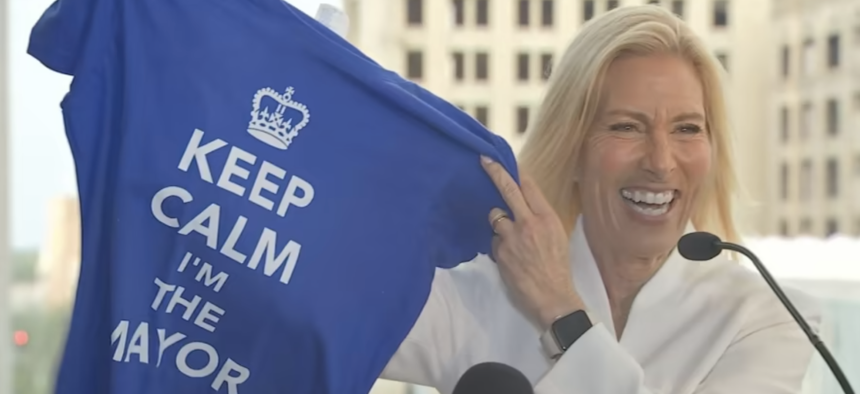Politics
Jacksonville mayor's race wasn't the only barn burner in this week's elections
Women make electoral history and Republicans lose ground: Here are five takeaways from Tuesday's contests, in Florida and across the country.

Screen shot from Local10 coverage
Big changes are in store for city halls in Jacksonville, Philadelphia and Colorado Springs, after voters on Tuesday chose groundbreaking candidates in each city for mayor.
Kentucky and Pennsylvania also held important contests for state officials, and Democrats held onto their razor-thin majority in the Pennsylvania House of Representatives during a special election.
Republican voters chose Attorney General Daniel Cameron to challenge Kentucky Gov. Andy Beshear, a Democrat seeking reelection, in November. National Republican and Democratic groups are already gearing up for a potentially close race.
Cameron appealed to a large swath of Republicans in a crowded field. He is a former aide to U.S. Sen. Mitch McConnell of Kentucky, the Republican caucus leader, but also secured the endorsement of former President Donald Trump, who has feuded with McConnell. Cameron defeated an agricultural commissioner and a former U.N. ambassador on Tuesday.
There were dozens, though, of city and statewide races around the country Tuesday from which five noteworthy developments emerged:
1. Women continue to make gains
Donna Deegan will become the first woman mayor of Jacksonville, after the Democrat narrowly beat Republican Daniel Davis for leadership of Florida’s most populous city.
Meanwhile, by winning the Democratic primary, Cherelle Parker is on a clear path to becoming the next mayor of Philadelphia. She would become the 100th mayor of the city, and the first woman to hold the post.
A third of the most populous 100 cities in the country had women mayors as of earlier this year, according to the Center for American Women and Politics at Rutgers University.
2. Republicans lose ground in cities
Democrats control nearly two thirds of mayoral offices in the country, so any place Republicans have been able to win city hall races is noteworthy.
On Tuesday, though, the GOP lost control of mayor’s offices in the relatively friendly territory of Jacksonville and Colorado Springs.
Deegan bested an opponent who had been endorsed by Florida Gov. Ron DeSantis and much of the state’s Republican establishment. Her victory comes after Republicans flexed their muscle at the statehouse, passing conservative legislation on everything from immigration to education as DeSantis gears up for a likely presidential run.
“The victories come after the party in Duval [County] and across the state had been shellacked in recent elections. ... DeSantis carried the county by 12 points last year on his way to winning a second term by a 19-point margin statewide against Democrat Charlie Crist,” according to City & State Florida's coverage.
Republicans have held the Jacksonville mayor’s office since 2015.
Deegan credited “a broad coalition of people across the political spectrum that want a unified city” for her victory. “We will break down the wall between City Hall and bring all the people in to create a city that works for everyone,” she promised.
In Colorado Springs, a political newcomer not affiliated with a political party defeated a well-known Republican in a conservative stronghold. Restaurant owner Yemi Mobolade will become the city’s first elected Black mayor, in what the Colorado Sun called a “political earthquake.”
Mobolade easily beat Wayne Williams, a former Colorado secretary of state, in the contest.
3. Another rough night for election deniers
Kentucky Secretary of State Michael Adams won the Republican nomination for another term in office, despite challenges from two candidates who pushed unsubstantiated voter fraud theories.
Adams defended the state’s participation in ERIC, a multistate clearinghouse of voter information designed to prevent fraud, even though Republicans in several other states – including Florida – have withdrawn from the organization. Adams also criticized an opponent’s calls to hand count every ballot after elections, rather than use machines to do the tallying. It would be a “disaster,” he said.
“The other lesson I’ve learned from what happened to my colleagues in other states—Republicans who are incumbents in this office—is if you feed the tiger, it still eats you. If you cave and get into these conspiracy theories, all it does is validate them,” Adams told NBC News before the election. “You don’t get any respect or love for what you did, if you cave, they still eat you alive. … I’m not going to fall for that.”
In Pennsylvania, trial judge Patricia McCullough lost a bid for the Republican nomination for the state supreme court. McCullough bragged during the campaign that she was the “only judge in 2020 in the presidential election in the entire country” to stop her state’s electoral certification, although her move was quickly overturned by the state’s high court.
McCullough lost to Carolyn Carluccio, who now faces a Democratic opponent to fill a vacancy on the court. Democrats control the court with a 4-2 majority.
4. The hidden power of election formats
Recent mayoral races have shown how much of a role the format of city elections can play in determining a winner. One good example is to compare the fate of two candidates with similar platforms who ran in large cities this year.
Parker won a crowded Democratic primary with 33% of the vote in Philadelphia Tuesday, which all but guarantees her a general election victory in the heavily Democratic city. Parker has garnered national attention for promising to hire more police to address crime in the area and what that means for Democratic candidates in the rest of the country.
Likewise, in Chicago this February, Paul Vallas ended up being the top vote-getter in the initial election for mayor there with 33% of the vote. Vallas had also campaigned on beefing up the city’s police department to tackle an upswing in crime.
Unlike Parker, though, Vallas faced a run-off in a nominally nonpartisan election. But when he ran head-to-head against union organizer Brandon Johnson in April, Johnson beat him by 4 percentage points.
5. Crime continues to confound candidates
The issue of crime played a key role in local races, but this week’s results will do little to settle the debate over how local candidates should approach the public’s growing concern about violent crime and related issues.
Parker, for example, expressed some support for a stop-and-frisk approach that her predecessor had discouraged. That, along with her calls for hiring more police officers, drew many comparisons between her and New York Mayor Eric Adams, a former police officer who has fought with liberal city council members over the size and scope of the police force’s budget.
But in the Pittsburgh area, a public defender who promised to end cash bail and limit prosecutions of low-level offenses beat a 26-year veteran in a contest for Allegheny County’s top prosecutor. While Matt Dugan had a clear victory in the Democratic primary, his stance will be tested again in a potential rematch with Stephen Zappala if the incumbent qualifies as a Republican in the general election.
In Colorado Springs, Mobolade said crime was the most important issue facing the city. He promised to “strengthen public safety by addressing staffing shortages, improving incident response times, ensuring officers have the best training to fight crime, bolstering partnerships with local homeless providers, and addressing the frequent users of the 911 system.”
Jacksonville’s Deegan promised to hire 100 new officers if elected, but her opponent vowed to hire twice as many. Deegan said the increase in the police force should be coupled with more spending on efforts to improve literacy, reduce food insecurity and address poverty.
“So we must put officers on the streets, but we must do more than the same old same old to bring those numbers down,” Deegan said.
Daniel C. Vock is a Washington, D.C.-based senior reporter for Route Fifty, where this story was first published.
NEXT STORY: Donna Deegan flips Jacksonville mayor’s office blue
